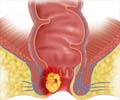HIV has been blamed for the surge in anal cancer incidence in US males between 1980 and 2005, but not in females, according to a study.

In order to determine the impact of HIV on anal cancer incidence in the U.S., Meredith S. Shiels, Ph.D., M.H.S., of the National Cancer Institute and colleagues looked at data from the HIV/AIDS Cancer Match Study—specifically the number of people with anal cancer with and without HIV between 1980 and 2005 in 17 U.S. states and metropolitan areas.
The researchers found that of the 20,533 anal cancer cases between 1980 and 2005, an estimated 1,665 individuals were infected with HIV. In 2001-2005, the most recent time period examined, 1.2% of women with anal cancer and 28.4% of men with anal cancer were HIV-positive. During 1980-2005, HIV infection did not have an impact on the increasing anal cancer incidence rates among women, but HIV had a strong impact on the increasing anal cancer incidence rates among men. "A large proportion of U.S. males with anal cancer in recent years were HIV-infected," the authors write, adding that, "Measures that would effectively prevent anal cancer in HIV-infected males could markedly reduce anal cancer rates at the population level."
Source-Eurekalert















